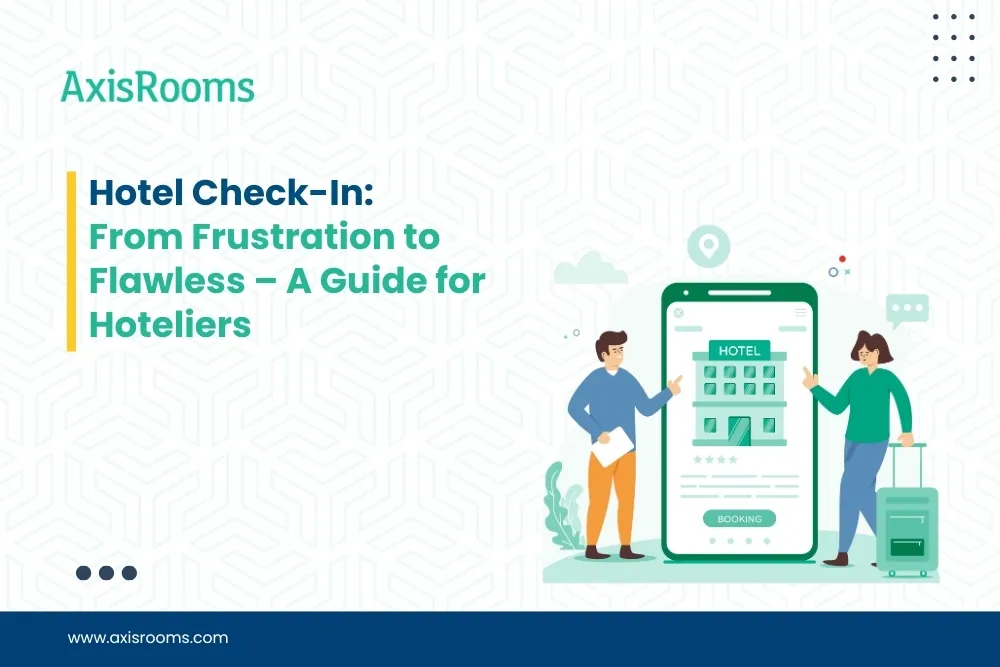Is Your Check-In Process Driving Guests Away?
A weary traveler steps into your hotel lobby after a long-haul flight. The front desk is buzzing with other guests, the receptionist is flipping through a reservation book, and your guest is left tapping their fingers impatiently on their suitcase. After ten minutes of waiting, they finally reach the counter, only to face another round of paperwork, payment confusion, and key card issues.
That’s a real-life scenario that happens in thousands of hotels every day. And the reality? Guests don’t just want a room—they want a smooth, welcoming, and efficient arrival experience that sets the tone for their stay.
If you’ve ever struggled with guest complaints about long wait times, overworked front desk staff, or outdated check-in procedures, you’re not alone. In this article, we’ll uncover how to transform the check-in experience from a stressful bottleneck to a seamless, guest-first journey.
Whether you’re still using traditional check-in methods or considering mobile and contactless solutions, this guide will help you craft an experience that impresses guests from the moment they arrive.
1. Understanding the Traditional Check-In Process
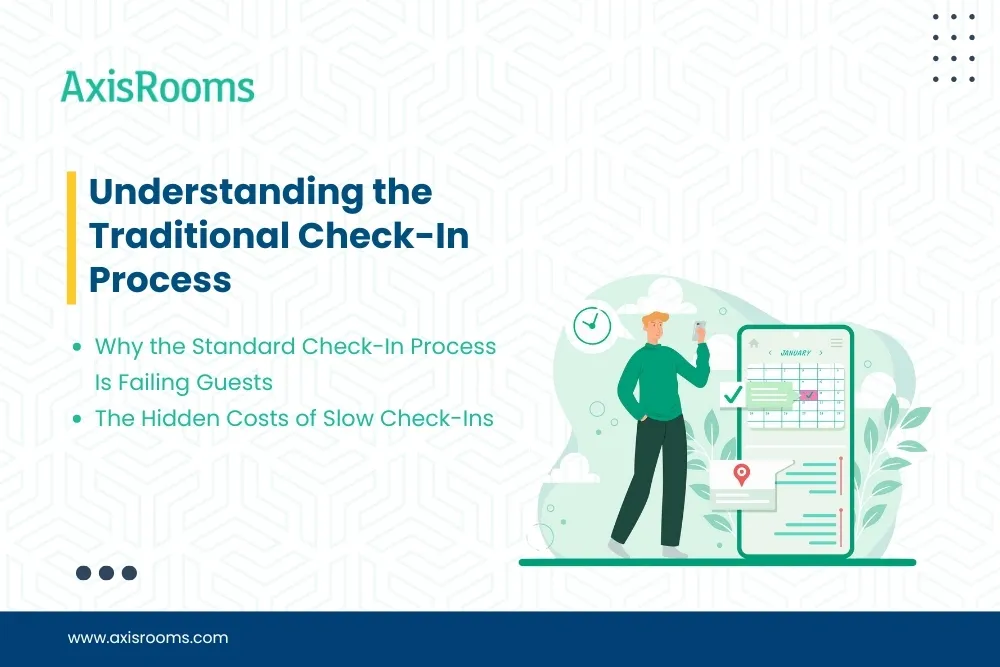
For decades, the traditional check-in process has remained largely the same:
- A guest arrives at the hotel lobby.
- They wait in line at the front desk.
- The receptionist verifies their identity and reservation.
- Payment details are collected.
- The room key is issued, along with some basic instructions.
While this method is familiar and well-structured, it’s also filled with inefficiencies that frustrate both guests and hotel staff.
1.1 Why the Standard Check-In Process Is Failing Guests
According to a study by Hospitality Net, 60% of travelers report frustration with long wait times at check-in, affecting their first impression of a hotel. The front desk can often become a bottleneck during peak check-in hours, leading to stressed-out staff and impatient guests.
Guests expect a check-in process that is quick, intuitive, and personalized—not one that feels like standing in a bank queue. If your hotel is still relying on manual paperwork, outdated systems, and long interactions at the front desk, you may be losing guests before they even step into their rooms.
1.2 The Hidden Costs of Slow Check-Ins
A delayed check-in isn’t just an inconvenience—it directly affects your revenue and reputation. A dissatisfied guest is:
- Less likely to return (repeat guests spend 67% more than new ones, according to Bain & Company).
- More likely to leave negative online reviews, deterring future bookings.
- A drain on staff efficiency, keeping front desk employees busy with administrative tasks instead of enhancing guest experiences.
If you want to maximize guest satisfaction and hotel efficiency, you need to rethink the check-in process.
2. The Rise of Mobile and Contactless Check-In
2.1 Why Mobile Check-In Is No Longer Optional
A 2023 Statista report found that 73% of hotel guests now prefer using mobile check-in and digital room keys.
Hotels that offer mobile and contactless check-in solutions are not just keeping up with trends—they are actively enhancing the guest experience.
Imagine a scenario where a guest checks in from their phone before even arriving, receives their digital room key via email, and heads straight to their room. No waiting, no front desk congestion, just a smooth, frictionless experience.
2.2 The Key Benefits of Contactless Check-In
Switching to mobile check-in technology offers game-changing advantages:
- No More Lines: Guests check in through an app or web portal, avoiding crowded lobbies.
- Greater Convenience: They can select their room, confirm payment, and receive their digital key—all from their smartphone.
- Enhanced Security: Digital keys reduce the risks associated with lost or duplicated key cards.
- Staff Efficiency: Receptionists can focus on personalized guest engagement rather than administrative work.
Hotels that have implemented mobile check-in solutions have reported a 50% decrease in front desk congestion, leading to higher guest satisfaction and better online reviews.
3. Enhancing the Guest Experience Through a Smarter Check-In Process
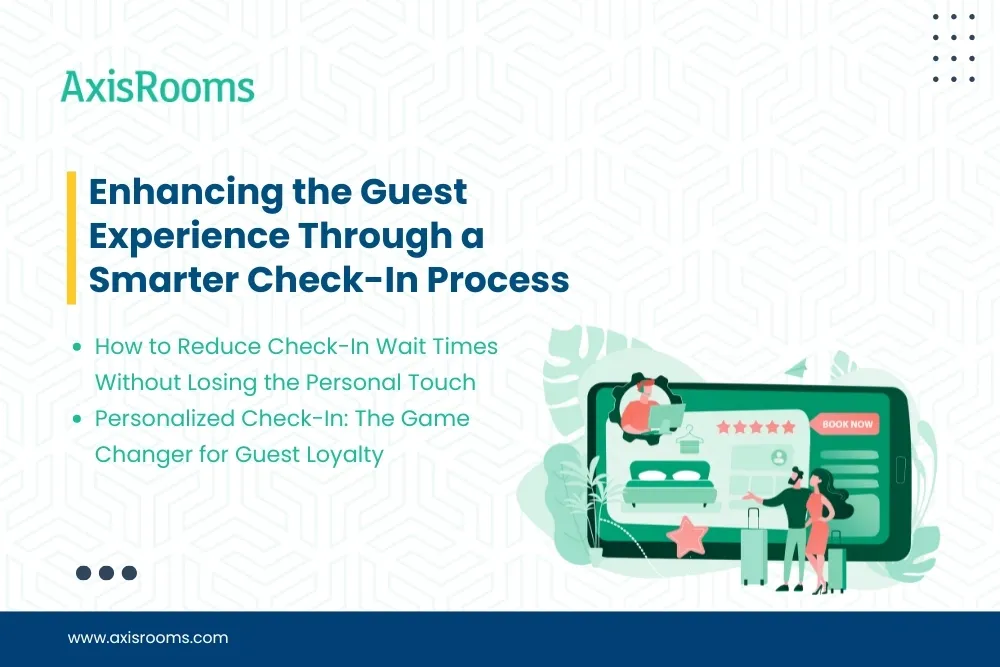
The check-in process isn’t just about handing over a key and verifying a reservation—it’s the first interaction a guest has with your hotel, and it sets the tone for their entire stay. A slow, inefficient check-in can frustrate guests before they even see their room, while a fast, personalized, and seamless experience makes them feel welcome and valued from the start.
A study by Hospitality Net found that hotels that reduce check-in times from over 10 minutes to under 3 minutes see a 20% increase in positive guest reviews . This isn’t just about speed—it’s about removing unnecessary friction while maintaining a warm, personal touch.
3.1 How to Reduce Check-In Wait Times Without Losing the Personal Touch
Nobody enjoys waiting in line—especially not after a long journey. A guest walking into your hotel shouldn’t feel like they’ve stepped into a bureaucratic process. Instead, check-in should be as smooth and stress-free as possible.
Here’s how leading hotels are cutting wait times while keeping service personalized:
1. Pre-Arrival Check-In Emails: Setting the Stage for a Smooth Experience
Instead of making guests fill out forms upon arrival, why not let them complete the process before they even step into the hotel?
Many modern hotels send pre-arrival emails that allow guests to input their details, confirm their arrival time, and even select their room preferences. This simple step eliminates unnecessary paperwork at the front desk, making check-in almost instant.
- Why it works: Hotels that use pre-arrival check-in forms reduce lobby congestion by up to 50%, as guests only need to collect their key or activate their digital key on arrival.
- Example: Luxury chains like Marriott and Hilton offer pre-check-in through their mobile apps, giving guests the ability to choose their room and skip the desk entirely.
2. Self-Service Kiosks: Instant Check-In for Guests Who Prefer Speed
Not every guest wants to engage with the front desk, especially business travelers or those arriving late at night. For these guests, self-service kiosks provide a fast, easy, and contactless alternative to the traditional check-in process.
- How it works: Guests can scan their ID, verify payment, and receive a digital key—all within minutes, without needing a staff member.
- The benefit: These kiosks can cut check-in time to under a minute, particularly during peak hours when front desk staff are overwhelmed.
- Hotels that use it: CitizenM and Yotel have fully embraced kiosk-based check-ins, allowing guests to bypass the front desk completely while still having access to concierge services if needed.
3. AI-Powered Front Desk Assistants: Smart Technology That Speeds Up Verification
AI is no longer a futuristic concept—it’s actively improving guest experiences in hotels today. One of the biggest bottlenecks during check-in is document verification—scanning passports, confirming payment methods, and updating guest records. AI-powered systems can handle this process in seconds, freeing up staff to focus on providing a warm welcome.
- Real-world impact: Hotels that use AI-driven verification systems see a 30-40% reduction in check-in time because staff are no longer manually entering data.
- Bonus: AI doesn’t just speed up check-ins—it also enhances security by detecting fraudulent documents or mismatched IDs instantly.
3.2 Personalized Check-In: The Game Changer for Guest Loyalty
Speed is important—but personalization is what truly makes guests feel special. A fast but robotic check-in experience is forgettable, but a quick, warm, and personalized check-in makes a lasting impression.
A survey by McKinsey & Company found that hotels that personalize guest experiences see a 40% increase in guest retention rates . Why? Because guests who feel valued are more likely to return and recommend your hotel to others.
Here’s how hotels can personalize check-in without slowing it down:
1. Address Guests by Name and Acknowledge Their Preferences
Think about how it feels when you walk into your favorite café and the barista already knows your usual order. That feeling of being recognized and remembered applies to hotels as well.
- Instead of saying, “Welcome to XYZ Hotel,” say “Welcome back, Mr. Johnson! We’ve got your favorite corner suite ready for you.”
- Hotels that use guest history data to pre-set room preferences (like temperature, pillow type, or minibar selections) create an effortless and memorable experience.
- Even small touches, like asking, “Would you like the same breakfast as last time?” can make a huge difference in guest perception.
2. Delight Guests with Small, Unexpected Gestures
Personalization doesn’t always have to be high-tech—it’s about creating moments that guests remember.
- Offering a complimentary room upgrade if available.
- Leaving a handwritten welcome note instead of a generic flyer.
- Providing a customized map of local attractions based on their interests.
Luxury hotels like The Ritz-Carlton have built entire brand reputations on anticipating guest needs before they even ask—and it’s one of the key reasons they have some of the highest guest return rates in the world.
3. Use AI to Recommend Personalized Room and Service Preferences
AI isn’t just for automation—it can also help hotels provide tailored guest recommendations.
For example, if a guest previously booked a spa package, the system could suggest similar wellness experiences upon their next stay. If a guest always dines at the hotel’s Italian restaurant, they could receive a personalized dining offer upon arrival.
- Hotels that use AI-powered personalization see up to a 20% increase in upsell conversions, as guests are more likely to book additional services when they are relevant to their interests.
- AI-driven check-in software can instantly recognize repeat guests and suggest room upgrades or loyalty perks, making check-in feel exclusive rather than transactional.
4. The Future of Hotel Check-In: Trends Hoteliers Can’t Ignore
4.1 AI-Powered Check-In and Smart Recognition
Some hotels are now using AI-powered kiosks with facial recognition to allow guests to check in without needing to present ID manually. This not only speeds up the process but also enhances security.
4.2 Voice-Controlled Check-Ins
Voice assistants like Alexa and Google Assistant are making their way into hotel rooms, allowing guests to check in and request services hands-free.
4.3 Blockchain for Identity Verification
Blockchain is now being explored for secure, tamper-proof identity verification, making check-ins safer and faster than ever.
5. How Hoteliers Can Implement These Changes Today
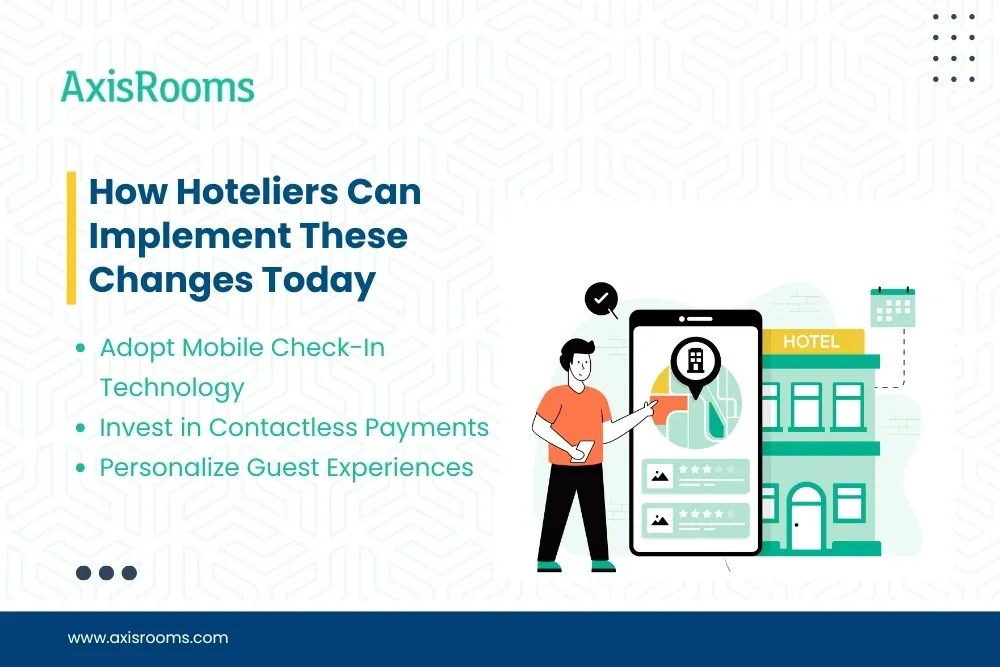
If you’re ready to transform your check-in experience, start with these actionable steps:
- Adopt Mobile Check-In Technology
- Reduce front desk congestion and long lines by allowing guests to check in via their phones.
- Implement a mobile-friendly PMS that integrates with digital keys and payment processing.
- Invest in Contactless Payments
- Enable seamless payments via mobile wallets, QR codes, and secure digital transactions.
- Personalize Guest Experiences
- Use AI-powered guest recognition to anticipate guest needs and make check-in feel effortless.
Ready to upgrade your hotel’s check-in experience?
Explore AxisRooms’ Hotel Management Solutions for an all-in-one platform that simplifies check-ins and enhances guest satisfaction.
Final Thought: Your Check-In Process Can Make or Break the Guest Experience
The check-in process is more than just a formality—it’s the first chapter of a guest’s experience at your hotel. It can either be a frustrating hurdle that leaves guests annoyed before they even see their room, or a seamless, welcoming moment that sets a positive tone for their stay. Every interaction at check-in shapes how a guest perceives your hotel’s efficiency, service quality, and commitment to guest satisfaction.
Hotels that continue relying on slow, outdated check-in methods are not just losing time—they’re losing guests. Studies show that 60% of travelers feel frustrated by long waits at check-in, and in today’s fast-paced world, guests expect instant access, personalized experiences, and convenience at their fingertips. A long line at the front desk or an impersonal, transactional check-in process can easily turn into a negative online review, pushing potential future guests away before they even consider booking.
Modernizing the Check-In Experience: What Really Matters?
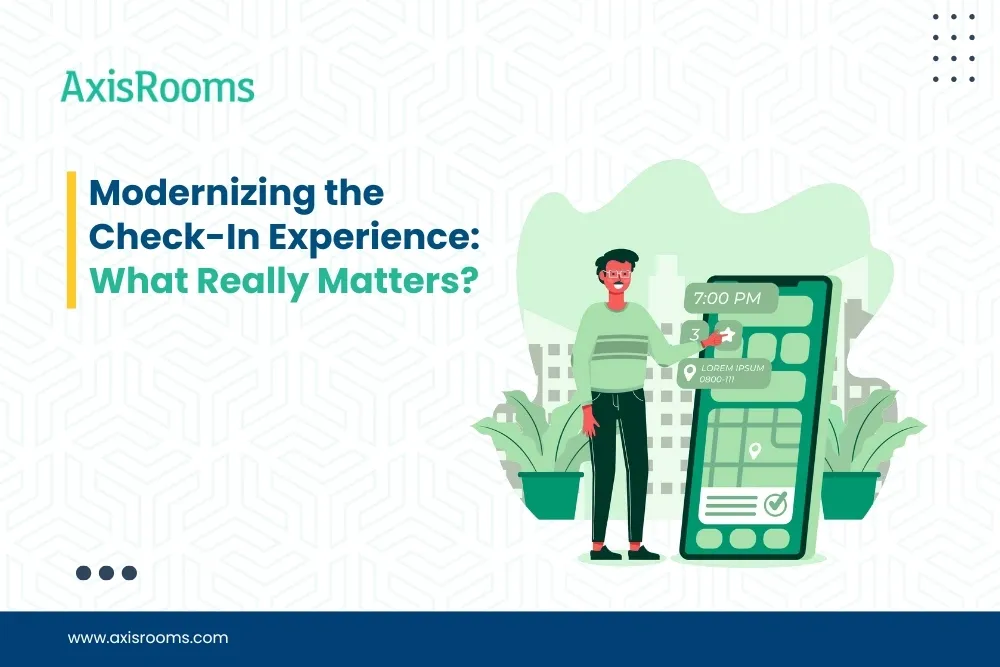
The solution isn’t to replace human service with technology but to use technology to enhance human interactions. Hotels that adopt mobile check-ins, self-service kiosks, and AI-powered verification systems are already seeing the impact—faster service, higher guest satisfaction, and improved operational efficiency. But simply speeding up check-in isn’t enough. The best hotels are those that combine efficiency with warmth, speed with personalization, and automation with thoughtful guest engagement.
A well-designed check-in process makes guests feel recognized, valued, and taken care of. Personalized greetings, small unexpected touches, and AI-driven service recommendations make a guest feel like more than just a room number. Whether it’s remembering their preferred room temperature, acknowledging their past stays, or offering thoughtful gestures like a complimentary upgrade, these details turn an ordinary check-in into a memorable experience.
The Business Case for Smarter Check-Ins
Beyond guest satisfaction, the check-in process directly impacts your hotel’s bottom line. Research shows that:
- Repeat guests spend 67% more than new guests (Bain & Company), and a smooth, personalized check-in makes them more likely to return.
- Hotels that cut check-in times from 10+ minutes to under 3 minutes see a 20% increase in positive reviews (Hospitality Net).
- Hotels that use AI-driven personalization see up to a 40% increase in guest retention rates (McKinsey & Company).
This isn’t just about keeping up with industry trends. It’s about meeting guest expectations, staying ahead of competitors, and increasing revenue through guest loyalty.
What Hoteliers Should Do Next
If your check-in process still relies on long front desk interactions, slow manual paperwork, or generic guest experiences, it’s time to reassess.
Start by identifying bottlenecks—are guests waiting too long? Are front desk staff overwhelmed? Are reviews mentioning slow check-ins? Once you’ve pinpointed the challenges, invest in the right solutions:
- Implement mobile check-in so guests can bypass the front desk and go straight to their rooms.
- Use self-service kiosks for guests who prefer speed over interaction.
- Incorporate AI-driven personalization so guests feel recognized and valued.
- Train staff to balance efficiency with warmth—speed should never come at the cost of hospitality.
With the right combination of technology, automation, and human connection, your hotel’s check-in process won’t just be a functional step—it will be a key driver of guest loyalty and satisfaction.
The Future of Hotel Check-Ins: Adapt or Fall Behind
The hospitality industry is rapidly evolving, and guest expectations are changing with it. Hotels that cling to traditional check-in models will struggle, while those that embrace technology to create a seamless, guest-centric experience will thrive.
It’s no longer about whether to modernize your check-in process—it’s about how quickly you can implement the changes that today’s guests expect. The good news? The tools to revolutionize your check-in process are readily available. Solutions like mobile check-in, AI-powered guest recognition, and contactless payment systems are not just for luxury brands—they’re becoming the industry standard across all hotel categories.

